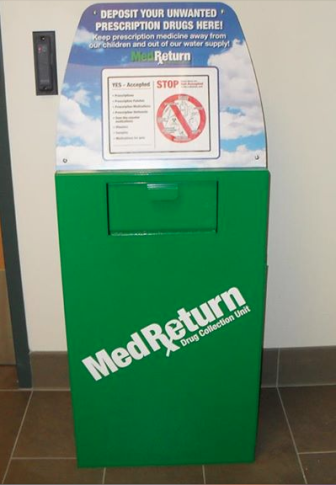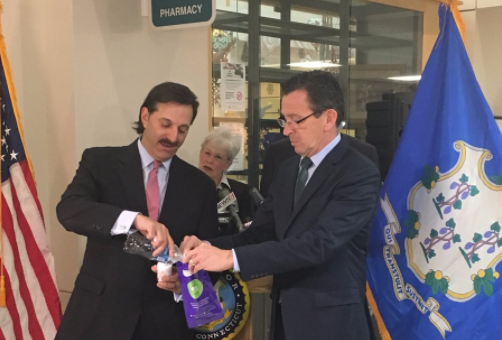Keeping prescription opioid pain killers in your home can endanger a kid who tries them or an addict yearning for them, and tossing them out or flushing them down the toilet can be bad for the environment.
So pharmacies across Connecticut have been given a bag with ingredients that, when tap water is added and the bag resealed, make the pills safe to toss in the trash. You can get one of these bags for free from CVS, Walgreens and some other pharmacies across the state.

Here\’s another way to get rid of any unwanted prescription medications: You\’ll see this bin for prescription drug drop-offs when you enter Darien Police Headquarters and turn left in the lobby.
The biodegradable bags, called “Deterra drug disposal kits” were donated by Mallinckrodt Pharmaceuticals. They can “deactivate and destroy up to 45 pills each simply by adding warm tap water and then disposing the kit in the trash,” according to an announcement from Gov. Dannel Malloy’s office.
You can also dispose of unwanted or old prescription medication by dropping it off at Darien Police Department any time, day or night, right in the lobby. There are some rules for that. (Here’s a Web page on the Darien Police Department website about the dropoff box.)
Here’s the announcement about the new disposal kits and information on them from the Governor’s Office, along with a video of the news conference. This is a condensed version of the long announcement:
Governor Dannel P. Malloy, Lt. Governor Nancy Wyman, and Attorney General George Jepsen today announced that — as part of the state’s ongoing efforts to combat the misuse of opioids — 80,000 drug deactivation kits capable of safely disposing unused prescription medications have been donated to the state of Connecticut and are now available free-of-charge to residents at over 600 pharmacies throughout the state.

Photo from Gov. Dannel Malloy's Twitter account
A demonstration at Gov. Dannel Malloy’s news conference on Thursday showing how easy it is to use the bags to dispose of drugs. (Warm tap water is recommended.)
The biodegradable Deterra drug disposal kits were donated by Mallinckrodt Pharmaceuticals and can deactivate and destroy up to 45 pills each simply by adding warm tap water and then disposing the kit in the trash.
With excess prescription opioids known to contribute to misuse, abuse, and addiction, these kits will allow Connecticut residents to safely dispose of these drugs at home without contaminating water sources or harming the environment.
Where to Get The Bags
In order to get the kits into the hands of consumers, state agencies have partnered with pharmacies throughout the state to help distribute the packets. Individuals seeking a drug disposal kit can visit their local pharmacy and obtain one free of charge.
Participating pharmacies include Big Y, CVS, Price Chopper, Rite Aid, Shop Rite, Stop and Shop, Walgreens, Walmart, and other independent outlets.
Why Disposing of Opioid Painkillers Is Important
“Opioid misuse from prescription drugs can effect anyone of any age or background — nobody is immune. We’ve unfortunately heard many stories from residents whose addiction began when they were prescribed a few pills to help with a certain medical condition, and then led them down a path of addiction and overdose,” Governor Malloy said. “I urge any Connecticut resident looking to dispose of unused medication to visit their local pharmacy and ask for one of these packets.”
“Innovations like these pouches address the a very real threat of unused meds being abused, and give consumers an easy opportunity to do the right thing in a way that is healthier for the environment,” Lt. Governor Wyman said.
How the Kits Work
Each of the at-home, Deterra drug disposal kits contains a water-soluble inner pod containing MAT12® activated carbon (charcoal). When medication is placed inside of the pouch, warm water should be added, which will dissolve the inner pod releasing the activated carbon.
The resulting solution will then dissolve any prescription pills, patches and liquids that were placed inside of the kit, allowing them to be adsorbed by the carbon, and rendering them inert and irretrievable.
Any pharmacy in the state that has not received kits or would like to request additional ones should contact the Connecticut Department of Consumer Protection’s (DCP) Drug Control Division at dcp.drugcontrol@ct.gov or 860-713-6065.
Risk to the Environment from Unsafe Disposal
“Prescription medications can contain heavy metals, toxins, acids/bases, high alcohol content, and other materials that when used properly in small dosages are safe,” Connecticut Department of Energy and Environmental Protection Commissioner Robert Klee explained.
“When misused or disposed of in bulk, these prescription medications can create significant hazards to the environment, the quality of our waters, and public health – that is why it is so important that we are all here working together on this important issue.”
Other Measures to Combat Opioid Abuse in Connecticut
Since taking office, Governor Malloy has enacted several policy changes to combat the opioid epidemic. These include:
- the 2011 adoption of Good Samaritan laws protecting individuals from prosecution for minor drug crimes who seek medical attention for a friend experiencing an overdose (Public Act 11-210);
- the 2012 adoption of third party prescriber laws allowing the prescription of naloxone to an individual who is not the direct user of the drug (Public Act 12-159);
- the 2014 expansion of Good Samaritan protections for any person who, in good faith, administers naloxone to save a life. Previously, only licensed health care practitioners were allowed to administer the medication without being civilly or criminally liable for the action. Following the law’s adoption, all Connecticut State Police Troopers completed a training program providing them with the skills to administer the medication. (Public Act 14-61);
- the 2015 adoption of legislation that expanded prescriber education, made use of the Prescription Monitoring Program (PMP) mandatory for all prescribers of controlled substances, expanded the scope of practice for pharmacists to allow them to directly prescribe naloxone and reconstituted the Alcohol and Drug Policy Council (ADPC) as a statewide coordinating body to fight the spread of substance abuse and overdose (Public Act 15-198); and
- the 2016 legislative package that, among other things, limits the prescribing of opioid drugs to seven days (with certain exceptions), and requires municipalities to update their medical service plans to ensure first responders are equipped with Narcan (Public Act 16-43).
News Conference Video
The video lasts half an hour:
Here’s a More Difficult Way to Get Rid of Old Medications
